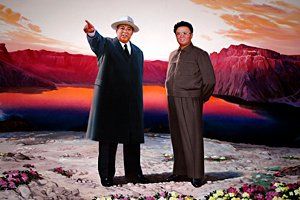
The Korean Peninsula is in crisis mode as North Korea shelled a South Korean island—injuring civilians for the first time in recent history—and South Korea responded by threatening to strike the North's missile bases. Some 200 residents have already fled the rocky outpost, Yeonpyeong, after the surprise artillery attack was launched shortly after midday Tuesday. Two South Korean soldiers were killed and 15 more injured, in addition to the three civilians, according to the South Korean Defense Ministry. News footage from the scene showed dozens of residential houses still in flames late Tuesday afternoon.
Outside analysts and government officials are already calling this latest escalation in violence evidence that North Korea is back to business as usual: acting as the world bully to extract concessions in the Six-Party Talks that were expected to resume shortly. Even the South Korean leadership, which has been ensconced in a crisis bunker since Tuesday, seems to buy this theory. According to an unnamed official in the Foreign Ministry, "Nobody knows exactly what they are thinking, but a return to Six-Party Talks could be part of it." Others have also hinted at the coincidental timing with one of North Korea's largest food shortages: some half a million tons of grain needed in the next months to feed the famished rural population.
The scary truth? What we are seeing is more likely the beginning of a hardline policy shift, the likes of which the world has not seen since the Stalinist regime's last power succession, when the Dear Leader, Kim Jong-il, took the reins from his father, Kim Il-sung. Indeed, the shelling of Yeonpyeong took place in the same waters as the sinking of the South Korean military vessel, the Cheonan, this March, which killed 46 soldiers. News also emerged this past weekend, from two returning American delegations, that the nuclear-armed regime has built a secret second uranium-enrichment plant. Many analysts expect the North Korean military to proceed with its third nuclear test any day now.
Such hardening aggression against the South suggests that the Dear Leader's recently anointed successor, his baby-faced third son, Kim Jong-un, has already begun the process of cementing his power base in the military-first society. The recent escalation in fact is analagous to the deadly antics of Kim Jong-il in his early years as ruler-in-waiting. In 1983, he was thought to have orchestrated the attempted assassination of the South Korean president, who was traveling in Burma at the time. The failed attempt killed 21 people, including several members of the South Korean cabinet.
This throwback to the regime's Cold War antics marks the return of the North's fire-breathing generals, who have increasingly cemented their control over the younger Kim. Since last year, when succession rumors began trickling out, military branches of the government, such as the National Defense Commission and the Korean People's Army, have been issuing ever more bellicose statements, instead of official remarks being sent out by the relatively moderate Foreign Ministry. It has been rare until now for soldiers—rather than diplomats—to be the ones hurling the regime's signature tirades against the West and South Korea.
Though the latest attack may seem like the sort of saber-rattling the North routinely uses to get Washington or Seoul's attention, the relatively rational moderates in Pyongyang who have perfected this tactic are already out of the picture. The key decision makers are now the hawkish generals, a faction that the Dear Leader has become increasingly dependent on. The power dynamic here is fast changing: Kim Jong-il looks to be beholden to his generals—rather than the other way around—in order to solidify the rickety succession to his son, who though he has no prior military experience was given a four-star-general rank this September during the rare party conference.
Until the revelations of the secret enrichment facility and this attack, the outside world has been largely expecting the regime to return to the Six-Party Talks. But were the North Koreans ever planning on sitting down at the negotiating table? It doesn't look like it. First, they historically have never cut a deal with weak foreign leaders, and both Washington, with its midterm election rout of the Democrats, and Tokyo, with Naoto Kan's record-low approval ratings, have embattled leaders. More strategically, the North Koreans sense that they're not going to get a favorable—or long-lasting—deal until after 2012, when the U.S., South Korea, and Russia have their presidential elections and Hu Jintao steps down in China.
But the jostling within the regime has the grave potential to threaten a peninsula already in crisis mode. Seoul's stance is hardening, with the conservative president, Lee Myung Bak—who broke away from the country's longstanding "Sunshine Policy" toward the North—reportedly instructing his generals in a videoconference shortly after the attack to retaliate in force, although the response has been restrained so far. Beijing is also growing increasingly frustrated, if not worse, with its little brother. (By the tepid statement of the Foreign Ministry on Tuesday for both sides to "do more to contribute to peace," it sounds like Beijing has practically given up on reining in its nuclear neighbor.)
While there is no outright internal split in China over the country's ineffectual North Korea policy, the last thing Beijing wants is an emboldened Pyongyang setting off another Cold War standoff in North Asia that inevitably pits China against the U.S. at a time when China's next leader, the untested Xi Jinping, is stepping up to the plate. In the middle of all this, North Korea is likely gloating, happy that it is once again back on center stage.
With Melinda Liu in Beijing, and Christopher Dickey in Paris
Uncommon Knowledge
Newsweek is committed to challenging conventional wisdom and finding connections in the search for common ground.
Newsweek is committed to challenging conventional wisdom and finding connections in the search for common ground.





